






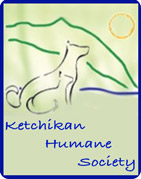



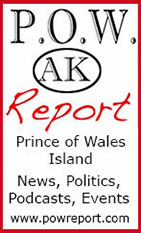

 Contact Contact 
 Webmail
Letters Webmail
Letters
 News Tips News Tips
 Copyright Info Copyright Info
 Archives Archives
Quick News
Search
 Alaska Alaska
 Ketchikan Ketchikan
 SE Alaska SE Alaska
Columns
- Articles
 Dave Kiffer Dave Kiffer
 Money Matters Money Matters
Historical
Ketchikan
 June Allen June Allen
 Dave
Kiffer Dave
Kiffer
 Louise
B. Harrington Louise
B. Harrington
Sports
 Ketchikan Links Ketchikan Links
Public Records
 FAA Accident Reports FAA Accident Reports
 NTSB
Accident Reports NTSB
Accident Reports
 Court Calendar Court Calendar
 Recent Filings & Case Dispositions Recent Filings & Case Dispositions
 Court Records Search Court Records Search
 Sex Offender Reg. Sex Offender Reg.
 Public Notices Public Notices
 Alaska Recall Alerts Alaska Recall Alerts
 Recalls.gov Recalls.gov
 AST Daily Dispatch AST Daily Dispatch
 KTN
Police Reports KTN
Police Reports
 Juneau Police Reports Juneau Police Reports
Weather,
Webcams
 Today's
Forecast Today's
Forecast
 KTN
Weather Data KTN
Weather Data
 AK
Weather Map AK
Weather Map
 AK Weathercams AK Weathercams
 AK Earthquakes AK Earthquakes

|
|

Friday
December 24, 2021

Hunter
SitNews Front Page Photo by JACY PIERSON©2021
To have your photo(s) featured on the front page,
email your photo(s) to editor@sitnews.us |
|
Alaska: Alaska Salmon Research Task Force Act is a first step towards addressing devastating salmon declines Posted & Edited By MARY KAUFFMAN - U.S. Senators Dan Sullivan and Lisa Murkowski (both R-Alaska) introduced the Alaska Salmon Research Task Force Act , legislation that would form a panel of Alaska’s salmon stakeholders and research experts to study Pacific salmon trends and create a coordinated research strategy for Pacific salmon in Alaska to support salmon management. The Research Task Force would be directed to conduct a comprehensive review of Pacific salmon science relevant to understanding and managing salmon returns in Alaska, and publish a report, within one year of convening, to provide recommendations identifying knowledge and research gaps and further research priorities for salmon in Alaska.
The proposed legislation came just days after a two-day Salmon Roundtable that the Alaska Congressional delegation hosted with a panel of Alaska Native leaders and state and federal officials. During the Salmon Roundtable, Alaska Native leaders from the Yukon, Kuskokwim, Unalakleet, and Chignik regions spoke to the impacts that issues like climate change and salmon bycatch are having on local wild salmon runs, which have returned at record-low levels in recent years.
“As was shared during the Salmon Roundtable, we are at a critical moment for the Yukon, Kuskokwim, Unalakleet, and Chignik watersheds. Dozens of Alaska Native communities are facing a long winter without salmon and a potential future without salmon. We can’t allow that in Alaska -— not on our watch,” said Tim Bristol, Executive Director of SalmonState. “And it’s not just those watersheds where salmon are struggling; we are seeing low salmon returns throughout much of the state and it’s taking a toll on Alaska’s local fishermen, businesses, and communities.”
“We applaud the Senators for taking an important first step towards ensuring Alaska remains a place where wild salmon and the people who depend on them thrive. We hope that their bill passes swiftly and we look forward to seeing what recommendations come from the task force. In the meantime, we encourage the Senators and state and federal agencies to utilize the research and information that’s already available and deploy immediate measures that we know for a fact will help Alaska’s wild salmon: protect Alaska’s most productive salmon watersheds, integrate Indigenous knowledge in management decisions, minimize any potential salmon bycatch, and invest in salmon habitat restoration and climate resiliency.”
“It is difficult to overstate the importance of salmon to Alaska, our communities, our economy and our traditional way of life. Over the past several years, Alaskans in some parts of the state have witnessed strong, historic runs of salmon, while Alaskans in other regions have seen shocking and unprecedented declines,” said Sen. Sullivan. “Our existing management system, with the state’s authority to manage Alaska’s salmon harvest and the federal government managing federal fishery salmon harvest and much of the at-sea research, has created a clear gap in research and research prioritization that urgently needs to be addressed. This crisis warrants the combined attention of our state and federal governments, and the expertise of our greatest scientific minds, as well as the indigenous communities that have harvested salmon for millennia. With this legislation, we would establish a body to expand our understanding, identify knowledge gaps, and ultimately drive us toward concrete policies and management decisions that we hope will bring increased abundance and stability to our salmon stocks for the benefit of all Alaskans.”
- More...
Friday PM - December 24, 2021
Alaska: State of Alaska Threatens Suit to Force Feds to Clean Up Contamination Left on ANCSA Lands
- In conjunction with the fiftieth anniversary of the Alaska Native Claims Settlement Act (ANCSA), the Alaska Department of Environmental Conservation (DEC) issued 548 notices of intent to sue the U.S. Department of Interior (DOI) for failing to clean up contamination on lands transferred to Alaska Native corporations.
“50 years after the passage of ANCSA, the contamination that the federal government left behind still threatens the health of Alaska Natives and limits the use of lands that were meant to be a resource for them in exchange for their aboriginal rights,” said Alaska Governor Mike Dunleavy. “Alaska Native people did not expect that the federal government would transfer contaminated lands in fulfillment of its obligations under ANCSA, but that is what happened.”
A variety of contaminants pollute these properties, including petroleum, heavy metals, polychlorinated biphenyls (PCBs), and solvents --all of which can pose serious health risks.
“We need the federal government to finally take action on prioritizing the cleanup of these sites that continue to contaminate our drinking water and our subsistence foods,” said Hallie Bissett, Executive Director, Alaska Native Village Corporation Association. "We are grateful to Governor Dunleavy for his support on this issue, and to DEC for moving forward with legal action on these sites.” - More...
Friday PM - December 24, 2021 |

Full Moon - Dec. 18th
As photographed from Pennock Island
S
itNews Front Page Photo by TERRI JIRSCHELE©2021
To have your photo(s) featured on the front page,
email your photo(s) to editor@sitnews.us |
|
Ketchikan: MERRY KETCHIKAN MERCHANTS & MUNCH 2021 A SUCCESS; Creating a Culture That Rewards Local Shopping - The Greater Ketchikan Chamber of Commerce, representing nearly 290 local businesses, is announce yesterday that the 2nd Annual Merry Merchants and Munch program garnered over $752,500 in local sales with 65 local merchants & restaurants participating. This year’s event ran from November 22-December 20, 2021.
The program began in 2020, with a simple goal: to help support the Ketchikan business community during a challenging time and reward those who chose to shop at local businesses. In 2020, 50 local merchants and restaurants participated, garnering $279,300 in local sales registered by cards turned in.
Local partners include the Ketchikan Area Arts and Humanities Council, who offer participation in the program to their members, as well as other community partners for various holiday events: The Cape Fox Lodge, The American Legion, The City of Ketchikan, KPUtv, PeaceHealth Medical Center Ketchikan, The Plaza, The Local Paper, and the Ketchikan Daily News.
In 2021, Alaska Airlines became a premier partner in this event, and donated two round trip tickets. Additional prizes in 2021 included two $500 local gift card prizes that were purchased by the Chamber at locally owned Chamber member, Alaskan and Proud Market. - More...
Friday PM - December 24, 2021
Alaska: Office of Alaska State Vet: Reindeer travel approved- In support of Christmas celebrations around the world, Alaska State Veterinarian Dr. Robert Gerlach recently issued a series of health certificates allowing Santa’s reindeer to travel from Alaska across state lines for toy delivery. While this annual effort attracts attention, it’s just a regular day for the Office of the Alaska State Veterinarian.
“Dr. Gerlach and Dr. Sarah Coburn work every day to help protect Alaskans by ensuring our pets and livestock are also healthy,” said Department of Environmental Conservation Commissioner Jason Brune. “Only allowing healthy animals to enter or leave our state is one of the things DEC does to help prevent the spread of diseases among animals or between animals and people.”
Office of the State Veterinarian is part of the Alaska Department of Environmental Conservation's Division of Environmental Health. Dr. Gerlach and Dr. Coburn, with the support of their team, are responsible for carrying out a wide variety of programs protective of both animal and human health, which in turn safeguards the health and food capacity of Alaska's livestock, reindeer (both magical and non-magical), and poultry, and prevents the transmission of animal disease to humans. - More...
Friday PM - December 24, 2021
|
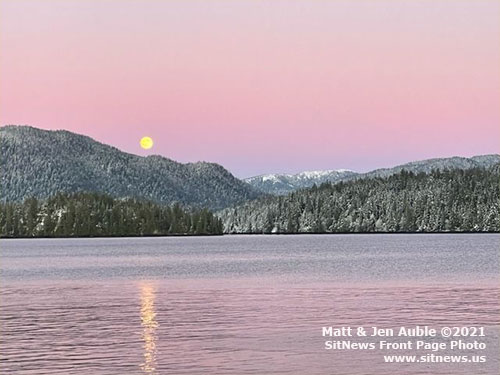
Moonrise Over Long Arm
The December full moon is also known as the Cold Moon.
SitNews Front Page Photo by MATT & JEN AUBLE ©2021
To have your photo(s) featured on the front page,
email your photo(s) to editor@sitnews.us |
|
Southeast Alaska: USDA awards Alaska Longline Fishermen’s Association with funding to conduct assessment of local seafood security and seafood industry workforce - The Alaska Longline Fishermen’s Association (ALFA) announced that it was selected by the U.S. Department of Agriculture (USDA) to receive a Regional Food System Partnership (RFSP) grant as part of the Agriculture Marketing Service’s Local Agriculture Marketing Program (LAMP). ALFA was one of 30 projects selected across 24 states to receive an RFSP grant and will use the funding to foster new partnerships around Alaska that help build a more resilient regional food system, specifically when it comes to local seafood access and seafood industry workforce development.
The impacts of Covid-19 highlighted long standing workforce development and food insecurity issues in Alaska. The seafood industry provides the backbone of coastal economies but relies on outside labor for processing, marketing, and shipping. Quarantine requirements led to significant labor shortages and high costs. In addition, currently less than 1 percent of the seafood caught in Alaska stays in Alaska to benefit the local economy. Alaska is one of the top five most food insecure states in the nation. 95% of the $2 billion of food Alaskan’s purchase is imported and 14% of Alaskans, including 20% of children, face food insecurity.
In response to the pandemic and food insecurity in Alaska, in March 2020, the Alaska Longline Fishermen’s Association formed a state-wide-coalition of nonprofits, tribal organizations, military organizations, city and boroughs, foundations, fishermen, and seafood processors to address food insecurity and workforce development challenges. The coalition was made possible with funding from Catch Together; a nonprofit that supports innovative conservation endeavors and fishermen-led efforts that address long-term access to local fishery resources, and the Alaska Community Foundation. This initiative, which became known as the Seafood Donation Program, provided stipends and workforce support to the seafood industry and deployed $2.5 million to purchase local seafood for distribution, providing more than 630,000 free meals of Alaska seafood to individuals and families facing food insecurity. - More...
Friday PM - December 24, 2021
Southeast Alaska: RARE COPPER PLATES MADE BY EDWARD CURTIS DONATED TO SHI; Plates feature portraits of Alaska Native people, culture from the early 1900s - Two entrepreneurs have donated to Sealaska Heritage Institute (SHI) eight old and rare copper plates showing portraits of Alaska Natives, a tomb, an old house and carvings photographed in the early 1900s.
The plates were made by Edward Sheriff Curtis (1868-1952), an American photographer and ethnologist whose work focused on the American West and on Native American people. He used a technology called “photogravure” which preceded the use of film.
Donors Steven Kern and Kenneth Zerbe, who purchased the photogravure plates in 1981 from the Classic Gravure Company, wanted SHI to have part of the Alaska portion of their collection, Kern said.
“We are thrilled and grateful to have these one-of-a-kind copper plates in our ethnographic collection. We are astounded by the generosity of the donors and glad we will have these for future generations to study,” said SHI President Rosita Worl.
- More...
Friday PM - December 24, 2021
Alaska: Anchorage Pioneer Home to open newly remodeled floor as a ‘neighborhood’ serving elders who experience dementia with complex behaviors -
The Alaska Department of Health and Social Services (DHSS) is announcing plans to open a Complex Behavioral Neighborhood serving people age 60 and older who experience complex behaviors related to dementia. The addition, on the newly remodeled 4th floor of the Anchorage Pioneer Home’s Southside Building, will serve up to nine elders and is expected to accept its first residents in early 2022.
The Anchorage Pioneer Home is one of six licensed assisted-living homes owned and operated by the State of Alaska Division of Alaska Pioneer Homes. The new neighborhood, which will be one of four distinct living communities or “neighborhoods” in the home, makes it possible for the Pioneer Homes to serve residents requiring the highest level of dementia care.
Features of the Complex Behavioral Neighborhood include high staff-to-resident ratios, as well as on-site primary care provider visits and behavioral consultations, activities for people with dementia, and specialized nursing services—all of which are designed to provide a higher quality of living for elders. In addition to routine dementia care training, staff will attend specialized continuing-education trainings in person-focused care, learning how to recognize and work with residents’ changing abilities, as well as techniques for avoiding and de-escalating conflict. - More...
Friday PM - December 24, 2021
|
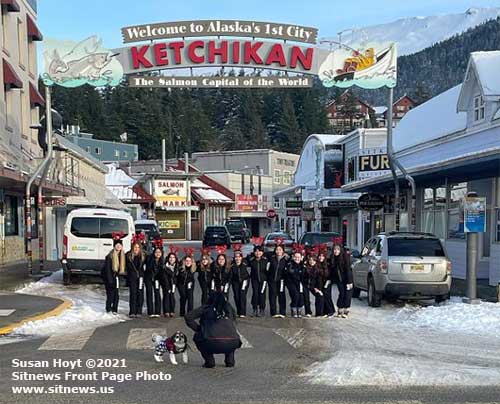
KHighlites
Posing after a short dance performance recently downtown Ketchikan.
SitNews Front Page Photo by SUSAN HOYT©2021
To have your photo(s) featured on the front page,
email your photo(s) to editor@sitnews.us |
|
Ketchikan: New General Manager for SSRAA - The Southern Southeast Regional Aquaculture Association (SSRAA) has hired Susan Doherty as its general manager. Doherty will be the fifth general manager to run the association since it was created in 1976.
Doherty has a long history with SSRAA. In 1980 she came through Ketchikan to visit a friend on her way further north for a job with Prince William Sound Aquaculture. An emergency at the Whitman Lake hatchery created a need for some immediate, short-term help, and Doherty jumped in to help. Impressed with her work, supervisors offered her a seasonal position, which then grew into a full-time, year-round position. By the time she left SSRAA in 2017, she was the research and evaluation manager, responsible for a team of employees, tasked with gathering and analyzing data on all aspects of SSRAA’s aquaculture programs.
Following her departure from SSRAA, Doherty became the executive director for the Southeast Alaska Seiners (SEAS). Her role at SEAS gave her additional experience in fisheries advocacy, data evaluation, and fisheries management, all of which will benefit SSRAA as Doherty steps into her new role. - More...
Friday PM - December 24, 2021
Alaska: King Cove Marks 157 Medevacs in Eight Years Since Rejection of Life-Saving Road;Residents Hopeful Interior Sec. Haaland Will Visit Soon Posted & Edited By MARY KAUFFMAN
-
Eight years ago yesterday, former U.S. Interior Secretary Sally Jewell under the Obama administration delivered grim news to the remote Alaska City of King Cove, just two days before Christmas: She announced her rejection of a congressionally-approved land exchange that would have facilitated a short, gravel one-lane road to connect the isolated community with the all-weather airport in nearby Cold Bay.
In 2009, Murkowski secured passage of legislation facilitating a land exchange to provide for the life-saving road, but former Secretary Jewell stunningly determined that it was not in the public interest. Now eight years later, 157 medevacs continue to show just how awful that decision was.
In 2016, Murkowski chaired a hearing of the Senate Energy and Natural Resources Committee to press for the life-saving road, receiving compelling testimony from local residents and a retired Coast Guard commander who located a plane crash near King Cove that had resulted in multiple fatalities.
In 2018, former Interior Secretary Ryan Zinke under the Trump administation signed a land exchange agreement to facilitate the construction of the life-saving road. However, that land exchange agreement continues to be held up by litigation from environmental groups.
Murkowski has reiterated her request to current Secretary of the Interior Deb Haaland under the Biden administration – who has prioritized tribal consultation – to visit King Cove and finally address this decades-long environmental injustice.
Quoting a news release from King Cove, the memory of former U.S. Interior Secretary Jewell's rejection of a congressionally-approved land exchange still haunts King Cove. Spokeswoman
Della Trumble of the King Cove (Native) Corporation and other residents have endured 157 medevacs over the eight years since that decision. Many of those medevacs have been carried out by the U.S. Coast Guard in dangerous weather conditions, threatening the lives of both the crew and patients.
“My family and others in King Cove were full of hope while getting ready to celebrate Christmas that year,” said Trumble. “Former Secretary Jewell called on December 23rd to give us the crushing news. It was absolutely devastating to hear.”
Despite that disheartening decision, King Cove residents have refused to give up on their dream of having a road that would provide them with safe and dependable ground transportation to the Cold Bay Airport. The mostly Aleut (Alaska Native) community is located between two volcanic peaks and is frequently plagued by hurricane-force winds, stormy weather and dense fog, which grounds or delays plane travel at least 30 percent of the time. - More...
Friday PM - December 24, 2021
|
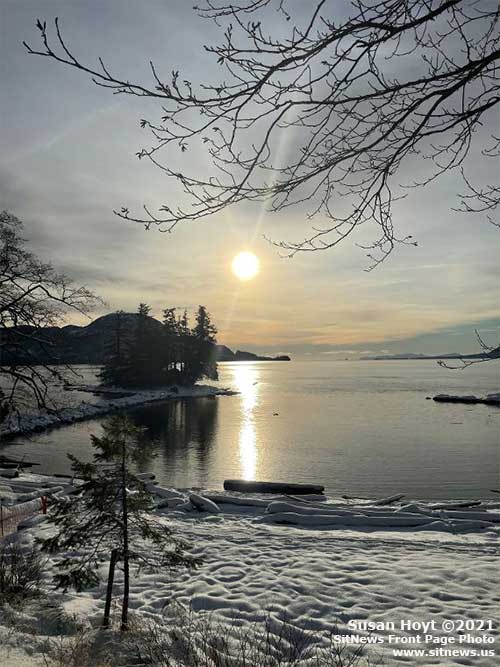
December Sunrise
Photo taken south of Ketchikan.
SitNews Front Page Photo by SUSAN HOYT©2021
To have your photo(s) featured on the front page,
email your photo(s) to editor@sitnews.us |
|
HISTORY: The magnificent history of the maligned and misunderstood fruitcake By JEFFREY MILLER - Nothing says Christmas quite like a fruitcake – or, at the very least, a fruitcake joke.
A quip attributed to former “Tonight Show” host Johnny Carson has it that “There is only one fruitcake in the entire world, and people keep sending it to each other.”
It’s certainly earned its reputation for longevity.
Two friends from Iowa have been exchanging the same fruitcake since the late 1950s. Even older is the fruitcake left behind in Antarctica by the explorer Robert Falcon Scott in 1910. But the honor for the oldest known existing fruitcake goes to one that was baked in 1878 when Rutherford B. Hayes was president of the United States.
What’s amazing about these old fruitcakes is that people have tasted them and lived, meaning they are still edible after all these years. The trifecta of sugar, low moisture ingredients and some high-proof spirits make fruitcakes some of the longest-lasting foods in the world.
The original energy bar
Fruitcake is an ancient goody, with the oldest versions a sort of energy bar made by the Romans to sustain their soldiers in battle. The Roman fruitcake was a mash of barley, honey, wine and dried fruit, often pomegranate seeds.
What you might recognize as a modern-style fruitcake – a moist, leavened dessert studded with fruits and nuts – was probably first baked in the early Middle Ages in Europe. Cinnamon, cloves and nutmeg were symbols of culinary sophistication, and these sweet spices started appearing alongside fruit in many savory dishes – especially breads, but also main courses.
Before long, most cuisines had some sort of fruited breads or cakes that were early versions of the modern fruitcake.
Fruitcakes are different in Europe than they are in America. European fruitcakes are more like the medieval fruited bread than the versions made in Great Britain and the United States. The two most common styles of fruitcake in Europe are the stollen and panettone.
British and American versions are much more cakelike. For over-the-top extravagance, honors have to go to a British version that crowns a rich fruitcake with a layer of marzipan icing.
Sweetening the pot
Fruitcakes came to America with the European colonists, and the rising tide of emigration from Britain to New England closely mirrored an influx of cheap sugar from the Caribbean.
Sugar was the key to preserving fruit for use across the seasons. One of the favorite methods of preserving fruit was to “candy” it. Candied fruit – sometimes known as crystallized fruit – is fruit that’s been cut into small pieces, boiled in sugar syrup, tossed in granulated sugar and allowed to dry.
Thanks to this technique, colonists were able to keep fruit from the summer harvest to use in their Christmas confections, and fruitcakes became one of the most popular seasonal desserts.
A dessert with staying power
Fruitcakes were also popular due to their legendary shelf life, which, in an era before mechanical refrigeration, was extremely desirable. - More...
Friday PM - December 24, 2021
|
MONEY MATTERS: KNOW THE CHANGES FOR YOUR 2021 TAX RETURN By MARY LYNNE DAHL , Certified Financial Planner ™
Retired
- Some things have changed that will impact your 2021 income tax return. It is a good idea to become familiar with the changes so that you can gather the data you will need to file your 2021 income tax on time and correctly. So, with that in mind, here is a list of some of the most notable changes:
Tax brackets have change. For single taxpayers, the lowest tax bracket of 10% is on taxable income of up to $9,950 then moves upward to 12% on income of up to $40,525, then 22% on income of up to $86,375 then up to 24% on income up to $164,925 then up to 32% on income up to $523,600 and tops out on income of more than $523,600.
For married couples filing jointly and qualifying widows/widowers, the lowest bracket of 10% is on taxable income of up to $19,900, then moves upward to 12% on income up to $81,050 then 22% on income up to $172,750 then 24% on income up to $329,850 then 32% on income up to$ 418,850 then 35% on income up to $628,300 and tops out at 37% on income of more than $628,300. - More...
Friday PM - December 24, 2021
FINANCIAL FOCUS: Give yourself some ‘paychecks’ for retirement Provided By BEN EDWARDS, AAMS® - During your working years, you’ve probably met the costs of living through your salary. But once you retire, where will the money come from? Is there a way to give yourself a “paycheck” for retirement?
There is indeed – but you’ll have to do a good job of managing your available income sources. Here are some moves that can help:
• Accept dividends and interest payments. Instead of automatically reinvesting all your dividends and interest payments into your portfolio – which is an excellent strategy for building wealth – you might want to begin receiving these payments as part of your income. Keep in mind, though, that companies can lower or discontinue dividends at any time. However, it’s also true that some companies have consistently paid, and even increased, dividends over many years, and even decades.
- More...
Friday PM - December 24, 2021
TOM PURCELL: THE BEST CHRISTMAS GIFT IS TIME - Our time is the best gift we can give to our friends and family this Christmas.
Nobody knows how much time we have on Earth — nobody knows when our time will end.
We all have friends and loved ones who were claimed way too early.
Hopefully, you are blessed, as my family has been, to have loved ones who have lived long and fruitful lives.
Such family members have an abundance of wisdom to share — wisdom cultivated over time.
I particularly enjoy the pearls of humorous wisdom my 88-year-old father has shared:
“Getting old ain’t for cowards!”
“At my age, never buy green bananas.”
“When life serves you a lemon, make lemonade — but crack open a Pabst Blue Ribbon first.” - More...
Friday PM - December 24, 2021 |
POLITICAL CARTOONS

Political Cartoon: Christmas Light
by Rick McKee, CagleCartoons.com
Distributed to subscribers by CagleCartoons.com

Political Cartoon: The longest night of the longest year
(The winter solstice was December 21, 2021)
by John Cole ©2021, The Scranton Times-Tribune, PA
Distributed to subscribers by CagleCartoons.com

Political Cartoon: World Peace
by Bill Day ©2021, FloridaPolitics.com
Distributed to subscribers by CagleCartoons.com

Political Cartoon: Loan Forgiveness Christmas
by Rick McKee ©2021, Counterpoint
Distributed to subscribers by CagleCartoons.com

Political Cartoon: Taking the Fifth
by John Darkow, Columbia Missourian
Distributed to subscribers by CagleCartoons.com

Political Cartoon: Biden Shrinking
by Dick Wright,©2021 PoliticalCartoons.com
Distributed to subscribers by CagleCartoons.com
|
Update in Progress
Thank you, Legislators, for your fiscal responsibility By Carl Marrs
- Instead of beating up the Legislature for failure to adopt a new dividend formula to replace the 40-year-old one we can no longer afford, we should be thanking them for passing another balanced budget that provides a reasonable dividend without resorting to further cuts to public services or new taxes to pay for it.
Every other state would love to be in Alaska’s position of being able to afford to pay for state government services without sales or income taxes with enough left over to pay out a dividend to all of its residents.
The key to doing this is to continue to abide by the statute which limits our Permanent Fund spending to 5% of its market value. This limit gave us $3.1 billion in revenue to spend for the current fiscal year. Along with significant oil and gas income, we had $4.7 billion in general fund receipts to pay for services.
The bipartisan House Majority came together with a pledge to not overspend our Permanent Fund earnings. They accomplished that in spite of pressure to overspend for a larger dividend which would not be sustainable in the future and would require major tax increases or new taxes.
Imposing taxes (sales and income) just to pay for a bigger dividend doesn’t make sense to most Alaskans. Sure, if we need taxes to pay for critical state services like schools, roads, police and prisons — like every other state — that may be a necessity in the future. But why would we set up more expensive bureaucracy to collect taxes just so we can send out a bigger dividend check? - More...
Thursday PM - December 16, 2021
 |
Hatred Convulses The World By Donald Moskowitz and Elizabeth (Jones) Moskowitz - The spate of hatred perpetuated against Asian Americans in the United States (U.S.) through physical and verbal attacks; and the discrimination against LGBTQ, Black, Latino, Indian and Jewish Americans in recent years highlights the persecution of minorities in the U.S. and the world. Blacks and Native Americans in the U.S. have experienced this over the past 300 years. Other minorities in the world have been subjected to persecution and discrimination, and all of the wars in the world have had an element of hatred within them. Genocide has been committed against the Armenians by the Turks, in Rwanda by Hutus against the Tutsis, in Cambodia by the Khmer Rouge, and by the Serbs against the Bosnians.
Jews in the world, especially in Europe, have been persecuted over the millennia, and they experienced the largest genocidal massacre of all time. The Holocaust in the 1930s and 1940s perpetrated by Nazi Germany and the Nazi leaders (who amazingly claimed to be devout Christians'), along with the acquiescence of the vast majority of the German people, exemplified the European hatred of the Jews. An Anti-Defamation League study in 2019 documented widespread anti-Jewish behavior persisted against a miniscule Jewish population of 0.2% of the total European population. Greece was at 67% Jew hatred with Jews only 0.05% of the Greek population, Poland 48%, Ukraine 46%, Hungary 42%, Russia 31%, Spain 28%, Austria 20%, Italy 18%, France 17% and Germany 15%. The United Kingdom, Netherlands, Belgium, Denmark, Norway, Sweden and Finland were 5% to 15%. In comparison the U.S. was 14%, but attacks are increasing by neo-Nazis and Muslims. Muslim countries in the Middle East and North Africa were at 74% Jew hatred. - More...
Thursday PM - December 16, 2021
 |
Political rage: America survived a decade of anger in the 18th century – but can it now? By MAURIZIO VALSANIA
- Americans have an anger problem.
People rage at each other. They are angry at public officials for shutting down parts of society. Or for the opposite reason because they aren’t doing enough to curb the virus. Democrats vent their rage at Republicans. And Republicans treat Democrats not as opponents, but as enemies.
More...
Saturday AM - December 04, 2021
Facing the Facts About Gun Violence in the U.S.
By Laura Finley
- A day after yet another tragic school shooting, I just finished teaching a criminology class about gun violence and how to reduce it in the U.S. I found that my students have many misconceptions about the scope and nature of the problem. I believe they are not alone, and that these misconceptions that many others may hold work against the development of thoughtful and effective policy. Although whole volumes can and have been written about this, I share here just a few observations. - More...
Saturday AM - December 04, 2021
Email your opinions and letters for publication to editor@sitnews.us
|
Articles &
photographs that appear in SitNews may be protected by copyright
and may not be reprinted or redistributed without written permission
from and payment of required fees to the proper sources.
E-mail your news &
photos to editor@sitnews.us
Photographers choosing to submit photographs for publication to SitNews are in doing so, granting their permission for publication and for archiving. SitNews does not sell photographs. All requests for purchasing a photograph will be emailed to the photographer.
|
|











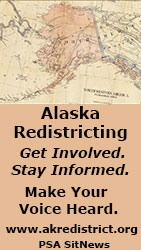

|
|
![]() Contact
Contact ![]()
![]() Webmail
Letters
Webmail
Letters![]()
![]() News Tips
News Tips![]()
![]() Copyright Info
Copyright Info![]() Archives
Archives![]() Alaska
Alaska![]() Ketchikan
Ketchikan![]() SE Alaska
SE Alaska![]() Dave Kiffer
Dave Kiffer![]() Money Matters
Money Matters ![]() June Allen
June Allen![]() Dave
Kiffer
Dave
Kiffer![]() Louise
B. Harrington
Louise
B. Harrington ![]() Ketchikan Links
Ketchikan Links![]() FAA Accident Reports
FAA Accident Reports ![]() NTSB
Accident Reports
NTSB
Accident Reports![]() Court Calendar
Court Calendar![]() Recent Filings & Case Dispositions
Recent Filings & Case Dispositions ![]() Court Records Search
Court Records Search![]() Sex Offender Reg.
Sex Offender Reg.![]() Public Notices
Public Notices![]() Alaska Recall Alerts
Alaska Recall Alerts![]() Recalls.gov
Recalls.gov![]() AST Daily Dispatch
AST Daily Dispatch![]() KTN
Police Reports
KTN
Police Reports![]() Juneau Police Reports
Juneau Police Reports ![]() Today's
Forecast
Today's
Forecast![]() KTN
Weather Data
KTN
Weather Data![]() AK
Weather Map
AK
Weather Map![]() AK Weathercams
AK Weathercams![]() AK Earthquakes
AK Earthquakes










































